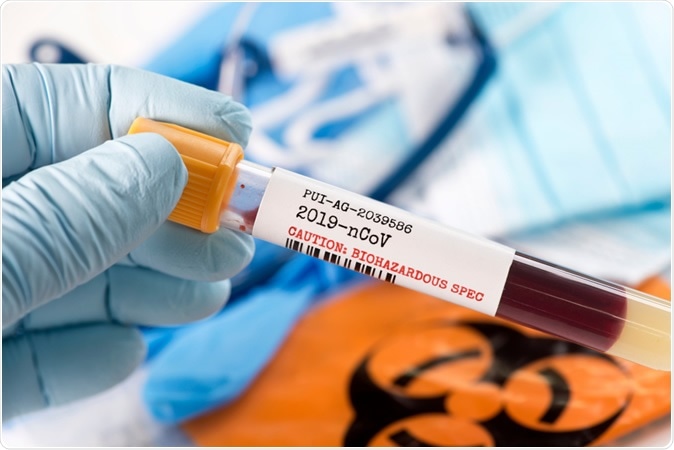A drug called auranofin, approved for the treatment of rheumatoid arthritis, effectively inhibits severe acute respiratory syndrome coronavirus (SARS-CoV-2) in laboratory conditions, as described in a new study by Georgia State University researchers.
SARS-CoV-2 is the viral strain responsible for ongoing coronavirus disease 2019 (COVID-19) pandemic that puts 20 percent of infected individuals in the hospital. Since COVID-19 started propagating, the quest for optimal treatment modality became a global priority.
Several existing medications, which were previously developed (or used) to manage other coronavirus diseases, HIV/AIDS, and malaria, are being researched – and even utilized as COVID-19 treatments. Alongside the potential use of convalescent plasma transfusion and high-priority vaccine development, finding an effective drug is one of the critical breakthroughs we need in order to tackle this pandemic.

Study: The FDA-approved gold drug Auranofin inhibits novel coronavirus (SARS-COV-2) replication and attenuates inflammation in human cells. Image Credit: Sherry Yates Young / Shutterstock
Drug repurposing research
A project where medications already approved by the US Food & Drug Administration (FDA) are screened for their potential utilization against SARS-CoV-2 is currently underway. One of such endeavors has been pursued by scientists from the Department of Biology, College of Arts and Sciences of the Georgia State University.
More specifically, they aimed to appraise the antiviral activity of auranofin – a gold-containing drug used for treating rheumatoid arthritis since 1985. Their findings are publicly available in the non-peer reviewed paper available on the preprint web-server bioRxiv.
"Drug repurposing is the fastest way to get a treatment for SARS-CoV-2 because it's already been established that these medicines are safe to use in humans", explained Dr. Mukesh Kumar, assistant professor of biology and one of the lead study authors.
The golden touch of auranofin
Auranofin is a chemical compound that contains gold particles. Therefore it is also known as a gold-salt compound. Such gold-containing drugs have known anti-inflammatory properties, and this specific triethyl phosphine can reduce cytokine production and stimulate cell-mediated immunity.
In addition to rheumatoid arthritis, auranofin was recently approved by the FDA to enter phase II clinical trials for cancer treatment. The drug was also investigated in other diseases such as neurodegenerative disorders and various infections (HIV/AIDS, tuberculosis, as well as some parasitic infestations). This prompted the researchers to appraise whether it can be used in the current COVID-19 pandemic.
The new study describes a process where human cells infected with the SARS-CoV-2 were treated with auranofin. Within 24 hours of treatment, viral concentrations in cells dropped by 85 percent, and within 48 hours by 95 percent. At the same time, auranofin was not toxic to the cells used in this research.
Treatment also significantly reduced coronavirus-induced inflammation, as well as the expression of cytokines (which are signaling proteins that attract immune cells to the infection site). The latter is rather crucial since it is known that many COVID-19 patients die of a "cytokine storm" when the body's immune response gets out of control, killing, in turn, healthy tissue and causing organ failure.
"This shows that the drug not only could inhibit replication of SARS-CoV-2, mitigating the infection but also reduce the associated lung damage that often leads to severe respiratory distress and even death", explains Dr. Kumar.
From bench to bedside
"Taken together, these results demonstrate that auranofin inhibits replication of SARS-CoV-2 in human cells at a low micromolar concentration", explain the authors in the paper. "We also demonstrate that auranofin treatment resulted in a significant reduction in virus-induced inflammation," they add.
These findings indicate that auranofin could indeed be a useful addition to our (currently limited) treatment armamentarium to limit SARS-CoV-2 infection and lung injury due to COVID-19. This is good news, as auranofin has a familiar toxicity profile and is considered safe for human usage.
Of course, this study was conducted in laboratory conditions with the use of Huh7 human cell line derived from liver cells and previously used extensively in hepatitis C research. Hence, further animal studies are needed to confirm this proof of concept before it can be tried in the clinical setting.
Source:
Journal reference:
- Rothan, H. et al. (2020). The FDA-approved gold drug Auranofin inhibits novel coronavirus (SARS-COV-2) replication and attenuates inflammation in human cells. bioRxiv preprint server. https://doi.org/10.1101/2020.04.14.041228